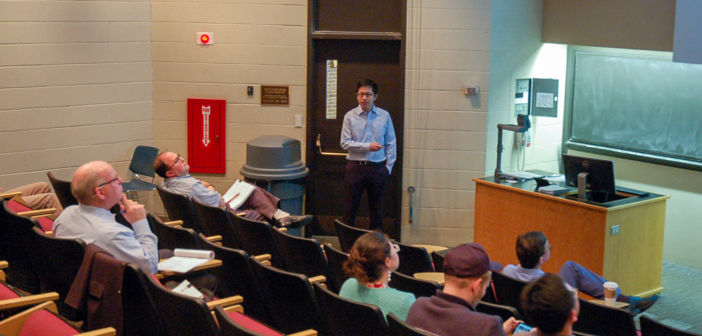It’s time for Lehigh’s annual doctor appointments.
The university’s doctoral students have begun the process of arguing their dissertations. This event is one of the final and vital steps in receiving their doctoral degree.
Iiona Scully, a third-year doctoral student who earned an undergraduate degree at Elmira College in 2011 and a master’s degree at Towson University in 2014, said she feels Lehigh is different from other institutions within its doctorate program, particularly when it came to size.
“One of the things Lehigh fosters is a communication between areas,” Scully said. “This program makes you feel part of a community that allows you do the research you want to do.”
Dominic Packer, the associate dean of research and graduate programs in the psychology department, said students have a collective relationship with their professors.
“People work very closely with the faculty in a more mentor-based relationship and students tackle research questions in close collaboration with faculty,” Packer said.
Packer said the primary aim of a doctoral student, no matter what their discipline might be, is to advance their given field in some way. He said the goal should be to think of something no one has ever done before.
He said undergraduate studies help with learning the framework and ideas of a field, while doctorate work has students becoming “independent investigators” in their own research.
This process of obtaining a doctoral degree can take anywhere from four to seven years and ends with writing a dissertation. Packer said the beginning of the process is similar to undergraduate study but quickly transitions into research and taking a general exam around the midpoint.
Scully said the exam is one week long and requires writing three 12-to-15-page papers.
“You basically have to synthesize and analyze the 100 readings you did that year,” she said.
While Lehigh doctorate programs share general similarities across disciplines in their workload, they are different in the day-to-day life of students. Kyle Brett, a second year doctoral student in the English program, is studying American literature and 19th century American literature with a minor field in transatlantic romanticism.
He said his coursework is different from Scully’s psychology requirements and other scientific programs.
“I read a book a day,” Brett said. “Coursework has been a blast, and it’s great that master’s and Ph.D students get to teach English 1 and 2, and I’m teaching the Lehigh Review.”
There are three full semesters of doctoral coursework, with a final semester spent organizing a reading list and communicating with a committee. Brett said this committee will turn into the exam committee that will eventually serve in preparation for a final doctorate examination.
“Once you’re done with coursework, you begin reading (a book a day) and work your way through literature and spend your days in meetings with faculty discussing the readings,” Brett said.
Brett said, “knocking on wood,” that once a student completes their examination, the hope is to begin writing their dissertation. Scully said she has aspirations to become a faculty member at a university where she can find a middle ground between continuing her research and teaching.






Comment policy
Comments posted to The Brown and White website are reviewed by a moderator before being approved. Incendiary speech or harassing language, including comments targeted at individuals, may be deemed unacceptable and not published. Spam and other soliciting will also be declined.
The Brown and White also reserves the right to not publish entirely anonymous comments.